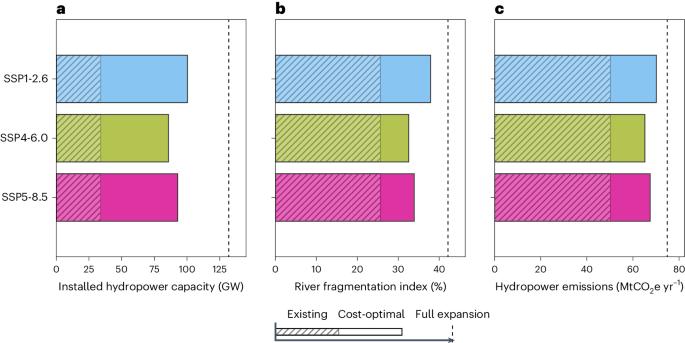Rethinking energy planning to mitigate the impacts of African hydropower
IF 25.7
1区 环境科学与生态学
Q1 ENVIRONMENTAL SCIENCES
引用次数: 0
Abstract
Around 100 GW of new hydropower projects have been proposed in continental Africa to contribute to meeting future energy demand. Yet, the future expansion of hydropower on the continent faces obstacles due to the impacts of dams on rivers, greenhouse gas emissions from reservoirs and increasingly competitive alternative renewable electricity technologies. Here we propose an integrated approach to include these considerations in energy planning. Compared with planning for least-cost energy systems, capacity expansion strategies balancing environmental and techno-economic objectives increase electricity prices and total discounted costs by at most 1.4% and 0.2%, respectively, while reducing impacts on annual hydropower emissions and river fragmentation by at least 50%. Our results demonstrate that refining techno-economic analysis in light of global and local environmental objectives can help policymakers reduce the river fragmentation and greenhouse gas emissions associated with hydropower development at marginal increases in energy costs. Meeting future energy demands in Africa will require expanded hydropower capacity, but the dams’ impacts on rivers, their emissions and alternative energy options call for careful planning. This study performs multi-objective energy system modelling for more sustainable dam expansion from the present to 2050.

重新思考能源规划,减轻非洲水电的影响
为满足未来的能源需求,非洲大陆已提议新建约 100 千兆瓦的水电项目。然而,由于大坝对河流的影响、水库产生的温室气体排放以及竞争日益激烈的替代性可再生电力技术,非洲大陆未来的水电扩张面临重重障碍。在此,我们提出了一种综合方法,将这些因素纳入能源规划。与成本最低的能源系统规划相比,兼顾环境和技术经济目标的扩容战略最多可将电价和总贴现成本分别提高 1.4% 和 0.2%,同时将对水电年排放量和河流支离破碎的影响减少至少 50%。我们的研究结果表明,根据全球和地方环境目标完善技术经济分析可以帮助政策制定者减少与水电开发相关的河流支离破碎和温室气体排放,而能源成本仅有微不足道的增加。要满足非洲未来的能源需求,就必须扩大水电容量,但大坝对河流的影响、大坝的排放以及替代能源方案都需要仔细规划。本研究为从现在到 2050 年更可持续的大坝扩建进行了多目标能源系统建模。
本文章由计算机程序翻译,如有差异,请以英文原文为准。
求助全文
约1分钟内获得全文
求助全文
来源期刊

Nature Sustainability
Energy-Renewable Energy, Sustainability and the Environment
CiteScore
41.90
自引率
1.10%
发文量
159
期刊介绍:
Nature Sustainability aims to facilitate cross-disciplinary dialogues and bring together research fields that contribute to understanding how we organize our lives in a finite world and the impacts of our actions.
Nature Sustainability will not only publish fundamental research but also significant investigations into policies and solutions for ensuring human well-being now and in the future.Its ultimate goal is to address the greatest challenges of our time.
 求助内容:
求助内容: 应助结果提醒方式:
应助结果提醒方式:


